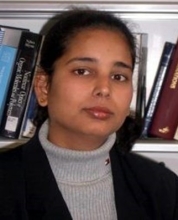
Professor
Department of Materials Science and Engineering
Departments of Chemistry, Biomedical Engineering, and Chemical and Biological Engineering
University of Wisconsin-Madison
Zoom: Meeting ID 982 8379 4389, Passcode 380564
Abstract: Surface anchored polymer chains provide a stable and versatile route to modifying a range of interfacial properties. These include biological, electronic, optical or frictional properties. However, the wide-scale usage of polymer brushes is limited by the scalability of the synthetic methodologies. We have developed a highly versatile universal approach to grow polymer brushes from a variety of substrates with high grafting density by using a single-component coating. We describe a random copolymer, which consists of a polymerizable initiator, copolymerized with a thermal crosslinker by reversible addition − fragmentation chain transfer polymerization. The chemistry of the coating is modified to implement a bottom up approach to fabricate nanopatterned polymer brushes. By self-assembly of a block copolymer film on top of the coating, nanopatterned brushes are grown after selective removal of one domain from the block copolymer. The initiator containing cross-linkable copolymer can be viewed as a single component ultra-thin polymeric coating, which is applicable to a range of substrates to grow high chain density polymer brushes. The ease of synthesis, chemical tunability, homogeneity of composition, stability in organic solvents and applicability by simple spin-coating to a wide range of substrates makes this a versatile approach to create functionalized interfaces.
Bio: Professor Padma Gopalan received her Ph.D. from Cornell University in Ithaca, NY, in chemistry. Upon completion, she conducted her postdoctoral work at Lucent Technologies, Bell Laboratories, NJ. Prior to graduate school, Gopalan obtained her M.Sc. in chemistry and M.Tech in polymer science and technology from the Indian Institute of Technology in New Delhi, India. She worked as a research associate in the Materials Division at the National Aerospace Lab in Bangalore, India, for two years on Kevlar fiber composites for lightweight aircrafts. She then moved from a national lab to a multinational company in Bangalore, the Norton group of companies called Grindwell Norton, as senior research associate in research and development, and developed, tested and productionized a "non-woven abrasive wheel" for light deburring applications. After working in this company for two years both as a senior research associate and a consultant, she decided to pursue graduate school at Cornell. She is currently a professor in the Department of Materials Science and Engineerng at the University of Wisconsin-Madison, and holds an affiliate appointment in the Departments of Chemistry, Biomedical Engineering, and Chemical and Biological Engineering. Currently her group consists of six graduate students and one postdoctoral fellow. Her research tackles problems that reside at the interface of chemistry, biology and materials science. Specifically, her research group focuses on self-assembly of block copolymers, polymer brushes and 1D materials. Her research is primarily funded by the NSF, DOE, ACS, DARPA, Army and Wisconsin Alumni Research Foundation (WARF). She is the recipient of the NSF-CAREER award for 2005 from the polymer program of Division of Materials Research (DMR). From August of 2012-August 2015, she directed the NSF-funded NSEC center at UW and has been instrumental in establishing soft materials characterization facility on campus. She is the recipient of the Romnes Faculty Fellowship from WARF for 2015, the Vilas Distinguished Achievement Professor for 2015-2020, and was appointed as Vilas Associate in 2017. She was a co-leader in the NSF-MRSEC center on campus (2015-2018). She was appointed to the prestigious position of a visiting professor through the World Research Hub at Tokyo Institute of Technology, Japan, from 2018 to 2020.
Share
Upcoming Events
-
MSE 298 Seminar: Mechano-Electrochemical Phenomena at Ceramic Electrolyte Interfaces
-
CBE 298 Seminar: Beyond the Tailpipe - From the Science of Soot Formation to the Engineering of Carbon Nanomaterials
-
MSE 298 Seminar: Innovation In Materials Science - An Industrial R&D Perspective
-
MSE 298 Seminar: Understanding the Impact of Grain Boundary Inclination on Grain Growth Using Modeling and Simulation and Experiments
-
EECS Seminar: Mixed Conductors for Bioelectronics
